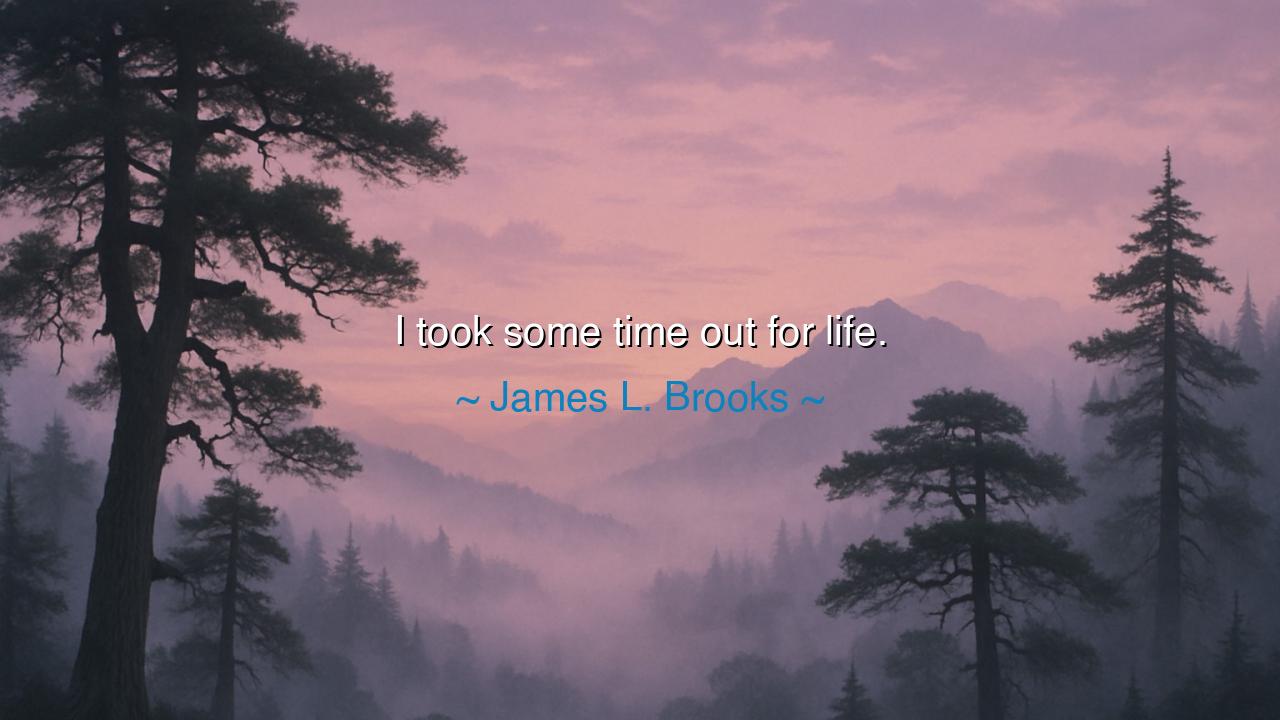
I took some time out for life.






The filmmaker and storyteller James L. Brooks once confessed with disarming simplicity: “I took some time out for life.” Though these words seem gentle and unassuming, they carry within them a wisdom that resounds like the voice of an elder. For what is life if it is consumed entirely by labor, ambition, or ceaseless striving? To take time out is not to waste time, but to reclaim it—to step aside from the whirlwind of duties and remember the sweetness of simply being alive. His words are a call to pause, to breathe, and to honor the sacred rhythm of existence.
The origin of this quote lies in Brooks’ own journey as a creator. Known for his work in film and television, he lived in a world of constant deadlines, demands, and relentless creation. Yet even within such a life, he recognized the necessity of stepping back. In saying he took time out “for life,” Brooks was reminding himself—and all who would listen—that no success, no creation, no labor is complete unless it is balanced by time to live, to love, to experience the world beyond work. His words are a rebellion against the tyranny of the clock, and a celebration of the fullness of human experience.
History offers countless reflections of this truth. Consider Marcus Aurelius, emperor of Rome and philosopher, who even amidst the endless burdens of ruling an empire, carved out time to write his Meditations. These were not words of conquest or politics, but of reflection on virtue, mortality, and meaning. In the quiet hours he claimed for himself, Marcus was not merely a ruler, but a man taking time out for life, finding wisdom beyond duty. His example shows that even the busiest lives must be punctuated by moments of stillness, or else they collapse under their own weight.
Think also of the life of Nelson Mandela, who, after twenty-seven years imprisoned on Robben Island, emerged not with bitterness, but with a spirit that still savored the simple joys of existence: the sun on his face, the laughter of children, the embrace of family. Though robbed of decades, he taught the world to value every moment, to recognize that even stolen years can yield beauty if one resolves to live fully. His life embodies Brooks’ truth: that even in hardship, one must take time out for life, or else the soul withers.
The deeper meaning of this quote is that life is not found only in great achievements or grand victories. It is found in the quiet walk under trees, in the warmth of conversation, in the stillness of reflection, in the breath that fills the lungs without effort. To take time out for life is to awaken to what truly matters, to recognize that existence is more than survival or productivity—it is communion, joy, and presence. Too often, men and women realize this only when time has already slipped away.
The lesson is both gentle and urgent: do not wait until the end of your days to remember to live. If you fill your life only with tasks, with goals, with the endless chase of tomorrow, you will find that tomorrow never arrives. Instead, weave moments of life into every day. Let laughter interrupt your work, let love disrupt your schedule, let silence heal your restless mind. For in the end, no one regrets the hours spent living; it is only the hours of neglect, of absence, of blind busyness, that weigh heavily on the soul.
Practically, this means choosing deliberately to pause. Step outside in the middle of the day and watch the clouds. Share a meal without rushing. Walk without destination. Speak to those you love without glancing at the clock. These are not wasted moments—they are the heart of existence. Let no one convince you that to pause is weakness; it is strength, for it shows that you are master of your hours and not their servant.
So remember, children of tomorrow: take some time out for life. For your work will wait, your duties will return, and the world will continue its ceaseless spinning. But the moments of living—those fleeting instants of joy, peace, and presence—will not wait. They must be seized as they appear. Take them boldly, take them gratefully, and let them remind you that the greatest achievement of all is not what you build, but how deeply you live.






AAdministratorAdministrator
Welcome, honored guests. Please leave a comment, we will respond soon